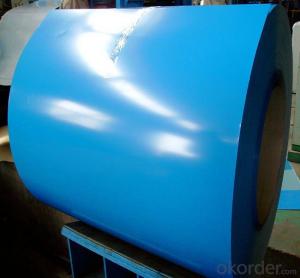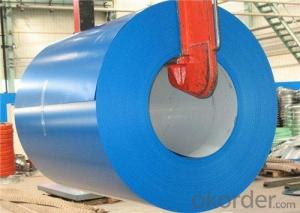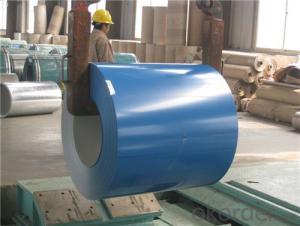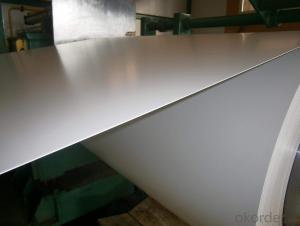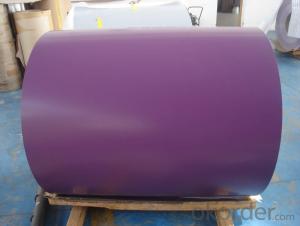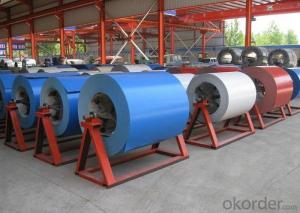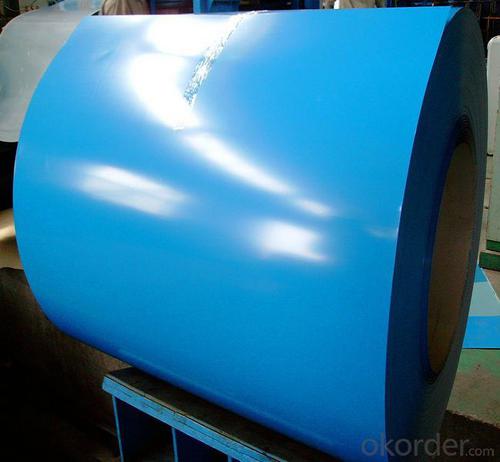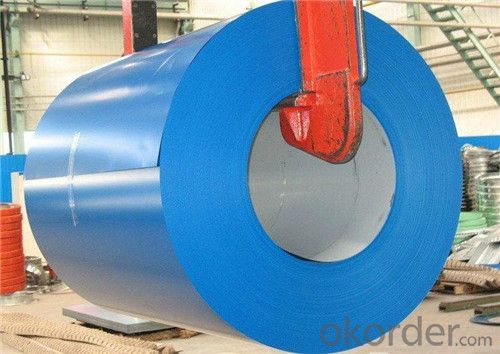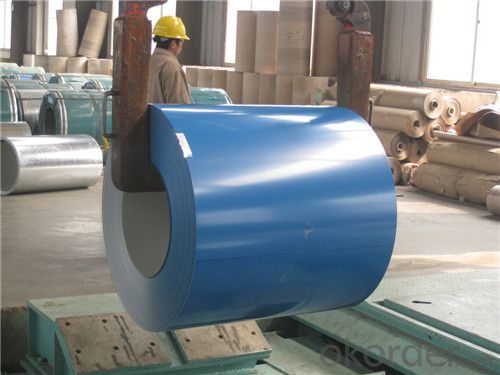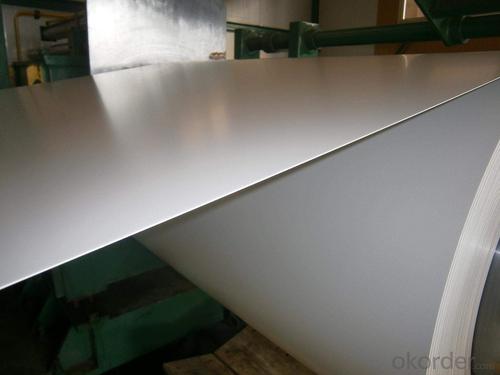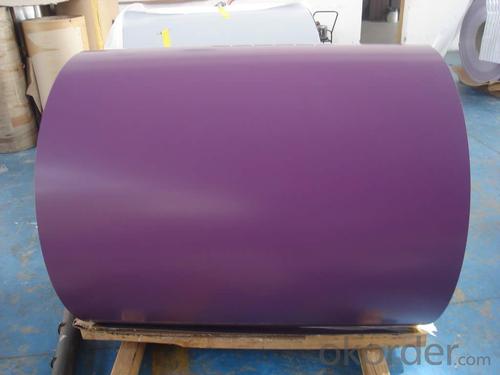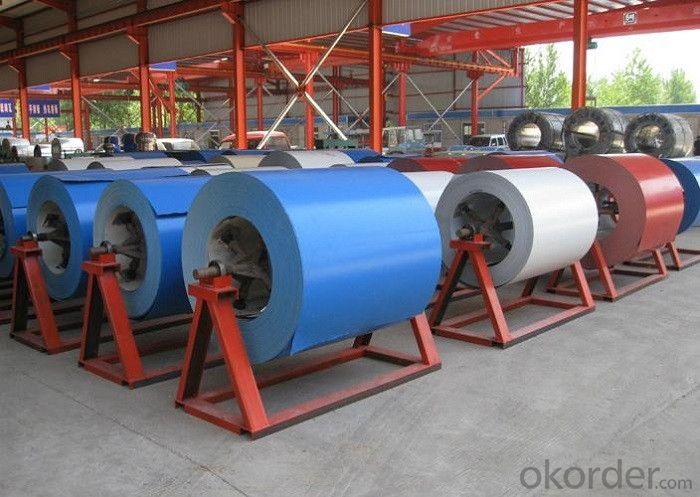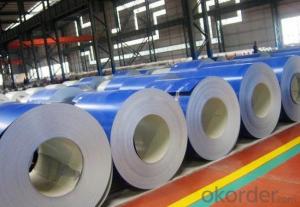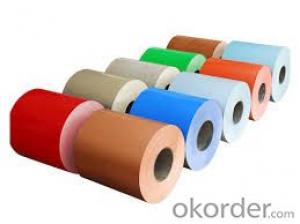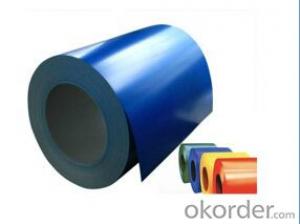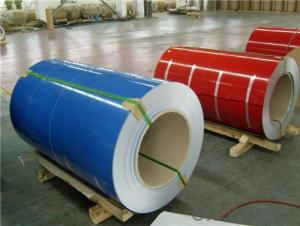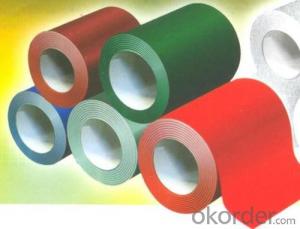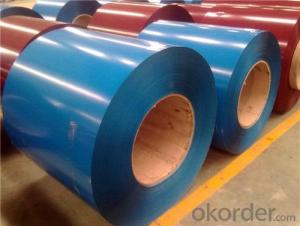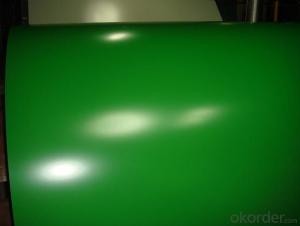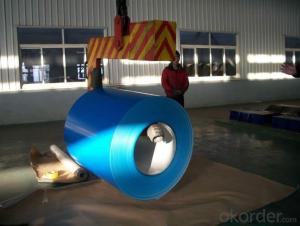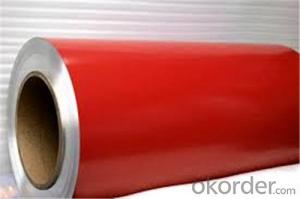Z21 BMP Prepainted Rolled Steel Coil for Construction
- Loading Port:
- Shanghai
- Payment Terms:
- TT OR LC
- Min Order Qty:
- 100 m.t.
- Supply Capability:
- 30000 m.t./month
OKorder Service Pledge
OKorder Financial Service
You Might Also Like
Structure of Z21 BMP Prepainted Rolled Steel Coil for Construction
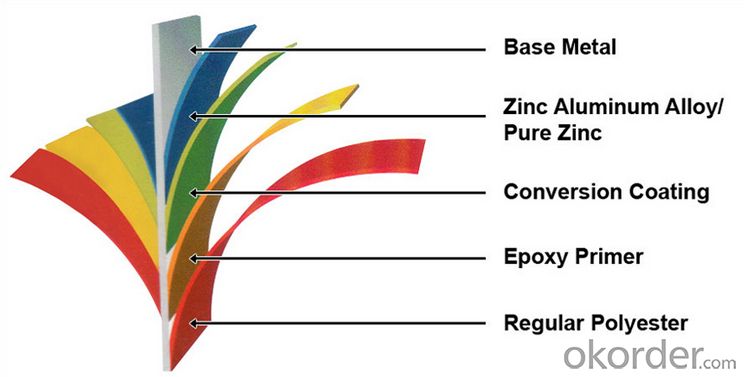
Description of Z21 BMP Prepainted Rolled Steel Coil for Construction
1. Prepainted steel coil is coated with organic layer, which provides higher anti-corrosion property and a longer lifespan than that of galvanized or galvalume steel sheets.
2. The base metals for prepainted steel coil consist of cold rolled, HDGI Steel, electro-galvanized and hot-dip alu-zinc coated steel. The finish coats of prepainted steel coil can be classified into groups as follows: polyester, silicon modified polyesters, polyvinylidene fluoride, high-durability polyester, etc.
3. The production process has evolved from one-coating-and-one-baking to double-coating-and-double-baking, and even three-coating-and-three-baking.
4. The color of the prepainted steel coil has a very wide selection, like orange, cream-colored, dark sky blue, sea blue, bright red, brick red, ivory white, porcelain blue, etc.
5. The prepainted steel coils can also be classified into groups by their surface textures, namely regular prepainted sheets, embossed sheets and printed sheets.
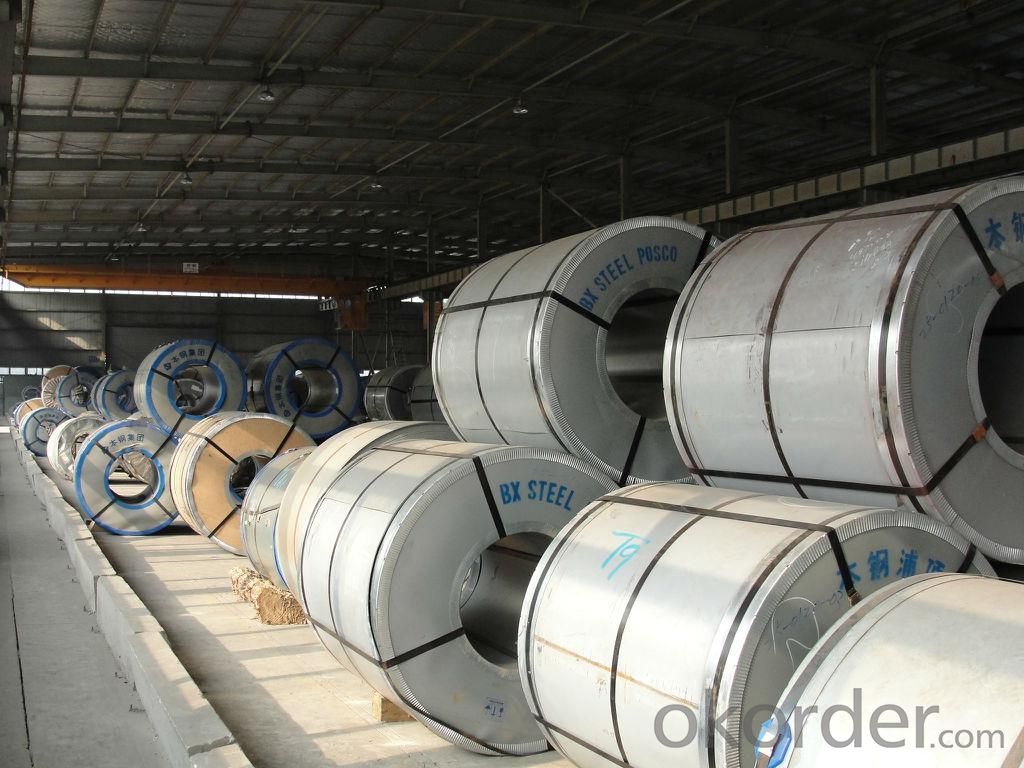
Main Feature of Z21 BMP Prepainted Rolled Steel Coil for Construction
Galvanized steel sheet(include HDG and EG)
With the features of good corrosion resistance, the products are mainly used in automobile, home appliance, electronics, building and machinery manufacture industries, etc.
Precoated steel sheet
With the features of enviromental protection and good processablility, long lasting surface durability, rich in colors, the products are maily used in building, home appliance and furniture industries, etc.
Electrical steel sheet
Mainly used to manufacture generating equipment, locomotive, industrial motor and home appliance.
Applications of Z21 BMP PPGI Prepainted Rolled Steel Coil for Construction
Construction
Manufacture anticorrosion, industrial and civil architecture roof boarding, roof grille
Light industries
Home appliance's case, civil chimney, kitchen utensils
Auto industry
Corrosion resistant parts of cars
Agriculture
Food storage, meat and aquatic products' freezing and processing equipment
Commerce
Equipments to store and transport materials, and packing implements
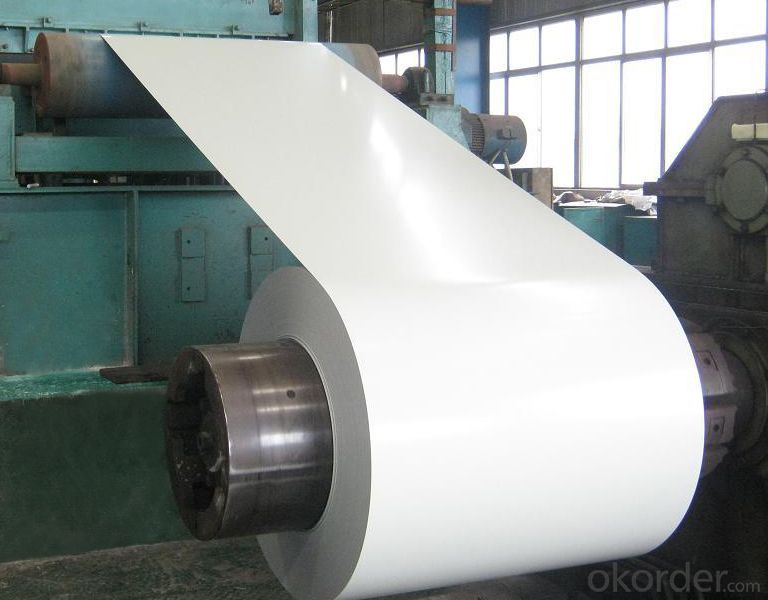
Specifications of Z21 BMP Prepainted Rolled Steel Coil for Construction
Product | Z21BMP Prepainted Rolled Steel Coil for Construction |
Material Grade | SGCC / SGCH / DX51D+AZ, etc |
Thickness | 0.6-3.0mm |
Width | 500-1500mm |
Tolerance | Thickness: +/-0.02mm , Width:+/-2mm |
Zinc-coating | Z30-150g/m2 |
Technique | Raw material: Hot rolled steel coil --> Cold rolled_>hot dipped galvalume |
Surface | Dried, Chromated, Unoiled |
Spangle | Regular spangle , small spangle, zero spangle |
ID | 508MM 610MM |
Coil weight | 1-25MT |
Export package | Cardboard inner sleeves, Waterproof paper, galvanized steel covered and steel strip packed |
FAQ of Z21 BMP Prepainted Rolled Steel Coil for Construction
1.What's your MOQ?
25MT, it is for one container.
2.Do you have QC teams?
Yeah, sure, our QC team is very important, they will keep the quality control for our products.
3.Are the products tested before shipping?
Yes, all of our PPGI and GI was qualified before shipping. We test every batch every day.
4.What's your normal delivery time?
Our delivery time about 15-20days for standard sizes, if you have other requirements like hardness, quanity and width ,it is about 20-40days. But don't worry ,we also try our best for the delivery time ,because time longer and our cost is higher.
- Q: What are the common applications of pre-painted steel coils?
- Pre-painted steel coils are commonly used in various industries for applications such as roofing, siding, wall cladding, and appliances. They provide a durable and aesthetically pleasing finish, making them ideal for both residential and commercial construction projects. Additionally, pre-painted steel coils are also utilized in automotive manufacturing, electrical enclosures, and industrial equipment due to their corrosion resistance and versatility.
- Q: What are the common manufacturing defects in steel coils?
- Common manufacturing defects in steel coils include surface defects such as scratches, pits, and dents, as well as internal defects like inclusions, cracks, and voids. Other common defects can include uneven thickness, waviness, and coil set.
- Q: What are the common methods of cutting steel coils?
- The common methods of cutting steel coils include shearing, slitting, and laser cutting. Shearing involves using a machine with two blades to cut through the coil. Slitting involves passing the coil through a set of rotating circular blades to create narrower strips. Laser cutting uses a high-powered laser beam to cut through the steel coil with precision.
- Q: What are the different coil packaging options available for steel coils?
- There are several different coil packaging options available for steel coils, depending on the specific requirements and preferences of the customers. Some of the commonly used packaging options include: 1. Steel Strapping: This is a traditional method of packaging steel coils, where a high-tensile steel strap is used to secure the coil. It provides excellent stability and protection during transportation and storage. 2. Plastic Strapping: Plastic strapping is a more cost-effective and lightweight alternative to steel strapping. It is commonly used for smaller and lighter steel coils, providing adequate strength and protection. 3. Shrink Wrapping: Shrink wrapping involves covering the steel coil with a plastic film and then applying heat to shrink and tightly seal the film around the coil. This packaging method offers protection against moisture, dust, and other contaminants. 4. Wooden Crates: Steel coils can also be packaged in wooden crates, which provide additional protection against physical damage during handling and transportation. Wooden crates can be customized to fit the specific dimensions of the coil and can be easily secured with straps or nails. 5. Coil Covers: Coil covers are large, heavy-duty plastic or fabric covers that are placed over the steel coil to protect it from environmental factors such as UV exposure, moisture, and dust. They are often used in combination with other packaging methods for added protection. 6. Paper or Fiberboard Wrapping: This packaging option involves wrapping the steel coil with paper or fiberboard material. It provides a lightweight and cost-effective solution for protecting the coil against minor scratches and abrasions. 7. Customized Packaging: Depending on the specific requirements of the customer, steel coils can be packaged using a combination of the above options or customized packaging solutions. This may include additional padding, corner protectors, or special handling instructions to ensure the safe transportation and storage of the coils. It is important for customers to consider factors such as coil size, weight, transportation mode, storage conditions, and budget when choosing the most suitable coil packaging option for their specific needs.
- Q: I am doing a experiment on mild steel soaked in sodium chlorideanyone can enlighten me about the effect of the sodium chloride in engineering term ?The mild steel specimen which I soaked in the sodium chloride has orange rust on it
- The mild steel contains a lot of Iron. The NaCl solution quickly attacks the iron content and forms rust. Over time, the solution may also cause what is called 'Chloride Cracking' of the steel. Pitting corrosion of stainless steel due to chlorides would certainly produce a rust-colored product. Passivation can be used to maintain a good corrosion resistant surface of stainless steel process vessel. There are many commercial products for this purpose. In the pharmaceutical industry, this process is often called derouging, that is to remove the buildup of iron oxides on the stainless steel process surfaces
- Q: Can steel coils be coated with thermally conductive materials?
- Yes, steel coils can be coated with thermally conductive materials. These materials are designed to enhance the heat transfer capabilities of the steel coils, allowing for efficient dissipation of heat in various applications such as electronics, automotive, and industrial processes.
- Q: How do steel coils contribute to the manufacturing of electrical equipment?
- Steel coils are used in the manufacturing of electrical equipment as they provide structural support and enhance the durability of various components. They are commonly used in transformers, motors, and generators, where they serve as the core material due to their magnetic properties. The steel coils help to create and maintain magnetic fields, ensuring efficient energy transfer and enhancing the overall performance of electrical equipment.
- Q: How are steel coils used in the manufacturing of marine equipment?
- Steel coils are used in the manufacturing of marine equipment as they serve as a primary material for constructing various components such as hulls, decks, and superstructures. The coils are shaped, cut, and formed into the desired shapes and sizes to create strong and durable structures that can withstand the harsh conditions of the marine environment. Additionally, steel coils are also used in the fabrication of marine machinery and equipment, including engines, propellers, and winches, due to their high strength and corrosion resistance properties.
- Q: How are steel coils inspected for chemical composition?
- Steel coils are inspected for chemical composition through a process called spectroscopic analysis. This involves taking a small sample from the coil and subjecting it to various tests, such as X-ray fluorescence or optical emission spectroscopy, to determine the precise elemental composition of the steel. This ensures that the steel meets the required specifications and quality standards.
- Q: Im looking at some knives and am wandering if they use good steel one is this case knife and its 54 dollars Do they use good steel or not Iv never had a good experience with Case but am wandering if they use good steel now? if you all have any other recommendations let me hear them I got my Selection from here so any others wont hurt. so basic break down does case use good steel know?
- Case knives are top quality in workmanship. Many have collectors vlaue. I once found an antique four-bladed Case knife is a school yard that had a bone handle. There are basically three types of knives purchased by those who purchase them for practical uses: Pocket knives, made principally for whittling and gneral light use Lock bladed knives Sheath knives I'm not including such novleties as switchblades or throwing knives The latter two types of knives are designed more for outdoor use. Typically they are more duarble and have high quality steel that enables the knife to hold an edge for a longer period of time than a knife made of softer steel. Pocket knives, by contrast, have smaller, thinner blades. Moreover, their steel tends to be a little softer. Comparable brands to Case would include Boker, Old- Timer and Uncle Henry (both Schrade-Walden tradenames), Camillus and others. Overall, I think you would be pleased with a Case knife. Their quality certainly exceeds such brands as Imperial or Queen.
Send your message to us
Z21 BMP Prepainted Rolled Steel Coil for Construction
- Loading Port:
- Shanghai
- Payment Terms:
- TT OR LC
- Min Order Qty:
- 100 m.t.
- Supply Capability:
- 30000 m.t./month
OKorder Service Pledge
OKorder Financial Service
Similar products
Hot products
Hot Searches
Related keywords
